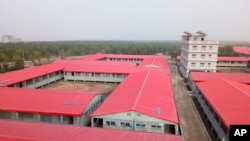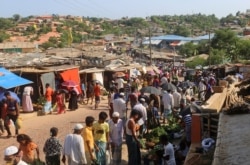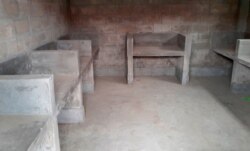Frustration is boiling over among several hundred Rohingya refugees being held in prison-like conditions on the remote Bangladeshi island of Bhasan Char, where they say they were beaten by authorities in response to a recent hunger strike.
“They said that they would keep us in this island for 14 days,” said one of the refugees, who told VOA that she and the others want to be reunited with their families in the refugee camps around Cox’s Bazar in southeastern Bangladesh.
“Now it has been five months that we have been detained here,” continued the woman, who asked not to be identified for fear of reprisal from Bangladeshi authorities. She said in a telephone interview that some women on the island have even tried to commit suicide by drowning or hanging themselves.
Another Rohingya man told VOA that naval and police officers responded to the three-day hunger strike by beating the refugees, a charge that is also being made by the advocacy group Human Rights Watch.
“They beat up our women and children, too. Later we withdrew the hunger strike after some officers said that we would be allowed to return to our camps within 15 days. We will begin a hunger strike again if they do not take us to our camps within 15 days,” said the man, who also asked that his name not be used.
In a report published Thursday, Human Rights Watch charged that the hunger-striking refugees were beaten with sticks and tree branches by Bangladesh navy officers.
Phil Robertson, deputy director of Human Rights Watch's Asia division, told VOA, "It's absolutely shocking that Bangladesh navy personnel are beating and abusing these Rohingya refugees, including children, for demanding that they be allowed to return to Cox's Bazar to be reunited with their families.
“If the larger political objective is to persuade Rohingya refugees to move to Bhasan Char, the authorities are going about it in precisely the wrong way.”
The government of Bangladesh has long been trying to relocate some of the hundreds of thousands of Rohingya refugees under its care to Bhasan Char, a silt island located in the Bay of Bengal. But the refugees have resisted, insisting that conditions on the island are unsuitable for living.
In April, Bangladeshi authorities intercepted several hundred Rohingya refugees who had been adrift on a fishing trawler for about two months after failing to reach Malaysia from their camps in Bangladesh. While some of the refugees slipped away to their camps, more than 300 of them — including around 200 women and 33 children — were taken to Bhasan Char.
Several of the refugees expressed their frustrations in interviews.
“I was going to Malaysia, where I was to get married,” said Sitara, a 19-year-old woman who, like many Rohingya, uses only one name. “Suddenly, I have landed in this island. My parents, brothers and sisters are in Cox’s Bazar. I want to return to them. I cannot live in this jail-like place. Why am I being held here against my wishes?”
Noor Fatema, another Rohingya woman, criticized the living conditions on the low-lying island.
“Water that we use on the island is mostly salty. In the drinking water often we find small insects. Almost all women here have got skin diseases like eczema and scabies. With water all around the island, we feel very scared when it rains hard,” she said.
“We have no freedom here. We are separated from our relatives. We want to return to our camps.”
Concern for the refugees has risen following a report last month by Amnesty International citing complaints that women on Bhasan Char had been sexually abused by police and naval personnel.
“Amnesty International is calling on the Bangladeshi authorities to conduct a full and thorough investigation into these allegations,” said the September 15 report.
Mahbub Alam Talukder, refugee relief and repatriation commissioner of Bangladesh, insisted the allegations of the sexual assault were “completely untrue.” The government has not announced when the refugees will be allowed to reunite with their families, the commissioner told VOA.
While reports said this week that the government is making fresh attempts to send about 100,000 Rohingya to Bhasan Char, refugees in Cox’s Bazar said none of them will voluntarily relocate to the island.
“Our community leaders who were taken on a tour to the island by the authorities last month said that the island is just over a decade old and gets flooded during heavy rain. There is not enough farmland. It is difficult for Rohingya people to live there,” said Abul Kalam, a Rohingya community leader in Balukhali camp.
Robertson of HRW said Bangladeshi authorities should allow the refugees to reunite with their families in the Cox's Bazar camps immediately.
“By the shoddy way it is treating these 300 refugees, Bangladesh is accomplishing the exact opposite of what it intended, which was to persuade Rohingya to voluntarily move to Bhasan Char,” he said. “The powers that be in Dhaka should recognize that if these refugees start dying from their hunger strike, the goodwill the international community has shown towards Bangladesh for taking in the Rohingya will quickly evaporate.”
Robertson added that the reports of abuses on Bhasan Char are “already spreading throughout the Cox's Bazar camps, making it increasingly unlikely that any Rohingya will voluntarily go there in the future."






